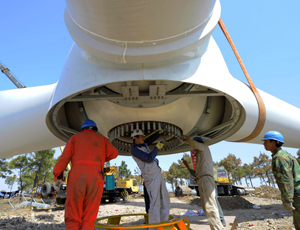The U.S. is gaining ground in its push to prompt China to end subsidies to its domestic wind-energy companies and give U.S. firms greater access to the booming Chinese wind market.

In the latest development in an eight-month trade dispute, U.S. Trade Representative (USTR) Ron Kirk says China has closed down a wind-energy fund that the U.S. contends violated World Trade Organization restrictions on subsidies.
Kirk said on June 7 that China shut its Special Fund for Wind Power Equipment Manufacturing, which the U.S. said did not abide by WTO regulations, because it provided grants to Chinese wind-turbine companies that used only Chinese-made components instead of imported parts.
Kirk’s office says the grants ranged from $6.7 million to $22.5 million and may have totaled several hundred million dollars since 2008.
USW President Leo W. Gerard praised the news that China’s wind power fund had been shut, but he said, “It needs to be followed up with continued vigilance to ensure the Chinese keep their commitments.”
Rob Gramlich, American Wind Energy Association senior vice president for public policy, said, “We support fair and open markets that provide a level playing field for all players and are encouraged by the bilateral progress made between the U.S. and Chinese governments.”
Gramlich added, “ Incentives for wind energy should not be tied to local content requirements, which are prohibited by WTO regulations.”
The U.S. had held talks with China on Feb. 16, and made the point that the grants from the fund were prohibited under WTO policies because they hinged on the companies’ use of domestically produced components.
USTR had made progress over the past several months on other green-energy issues that the USW raised in its September 2010 complaint, with China agreeing to change its criteria for approving wind-energy projects and ending two other subsidy programs.
But not all of the USW’s allegations in its the petition have been resolved yet, says union spokesman Wayne Ranick. He says that remaining open issues include financing by China’s Export-Import Bank at below-market rates and export credit insurance. “They remain issues of concern,” Ranick says.
The U.S. and USW campaign to gain greater access to China’s expanding wind power market isn’t surprising. China last year vaulted over the U.S. to be the largest producer of wind power in the world.


Post a comment to this article
Report Abusive Comment